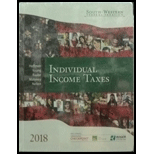
South-western Federal Taxation 2018: Individual Income Taxes
41st Edition
ISBN: 9781337385886
Author: William H. Hoffman, James C. Young, William A. Raabe, David M. Maloney, Annette Nellen
Publisher: Cengage Learning
expand_more
expand_more
format_list_bulleted
Question
Chapter 16, Problem 2RP
To determine
Discuss how to treat the $600,000 payment on person C’s 2019 tax return.
Expert Solution & Answer
Want to see the full answer?
Check out a sample textbook solution
Students have asked these similar questions
help this accounting answer
Materials quantity variance for may ?
5 PTS
Chapter 16 Solutions
South-western Federal Taxation 2018: Individual Income Taxes
Ch. 16 - Prob. 1DQCh. 16 - An individual taxpayer sells some used assets at a...Ch. 16 - Alison owns a painting that she received as a gift...Ch. 16 - Prob. 4DQCh. 16 - Prob. 5DQCh. 16 - Prob. 6DQCh. 16 - Prob. 7DQCh. 16 - Prob. 8DQCh. 16 - After netting all of her short-term and long-term...Ch. 16 - Prob. 10DQ
Ch. 16 - Prob. 11DQCh. 16 - Prob. 12CECh. 16 - Prob. 13CECh. 16 - Prob. 14CECh. 16 - Prob. 15CECh. 16 - Prob. 16CECh. 16 - Prob. 17CECh. 16 - Prob. 18CECh. 16 - Prob. 19PCh. 16 - Prob. 20PCh. 16 - Prob. 21PCh. 16 - George is the owner of numerous classic...Ch. 16 - Prob. 23PCh. 16 - Prob. 24PCh. 16 - Prob. 25PCh. 16 - Prob. 26PCh. 16 - Prob. 27PCh. 16 - Prob. 28PCh. 16 - Prob. 29PCh. 16 - Prob. 30PCh. 16 - Prob. 31PCh. 16 - Prob. 32PCh. 16 - Prob. 33PCh. 16 - Prob. 34PCh. 16 - Prob. 35PCh. 16 - Prob. 36PCh. 16 - Prob. 37PCh. 16 - Prob. 38PCh. 16 - Prob. 39PCh. 16 - Prob. 40PCh. 16 - Prob. 41PCh. 16 - Prob. 42PCh. 16 - Prob. 43PCh. 16 - Prob. 44PCh. 16 - Prob. 45PCh. 16 - Prob. 46PCh. 16 - Prob. 47PCh. 16 - Prob. 48PCh. 16 - Prob. 49PCh. 16 - Harriet, who is single, is the owner of a sole...Ch. 16 - Prob. 51CPCh. 16 - Prob. 1RPCh. 16 - Prob. 2RPCh. 16 - Prob. 3RPCh. 16 - Prob. 4RPCh. 16 - Prob. 1CPACh. 16 - Conner purchased 300 shares of Zinco stock for...Ch. 16 - Brad and Angie are married and file a joint...
Knowledge Booster
Similar questions
- I don't need ai answer general accounting questionarrow_forwardgeneral accountingarrow_forwardAt the beginning of the year, Meridian Industries estimated its manufacturing overhead to be $312,500. At the end of the year, actual direct labor-hours were 25,200 hours, actual manufacturing overhead was $298,600, and manufacturing overhead was overapplied by $29,800. If the predetermined overhead rate is based on direct labor-hours, then the estimated direct labor-hours at the beginning of the year used in the predetermined overhead rate must have been: (Round your intermediate calculations to 2 decimal places.)arrow_forward
- Net income is $145,000, accounts payable increased $12,000 during the year, inventory decreased $8,000, and accounts receivable increased $15,000 during the year. Under the indirect method, what is net cash provided by operations? Provide answerarrow_forwardTotal unit cost part Y isarrow_forwardNeed help with this question solution general accountingarrow_forward
arrow_back_ios
SEE MORE QUESTIONS
arrow_forward_ios
Recommended textbooks for you
 Individual Income TaxesAccountingISBN:9780357109731Author:HoffmanPublisher:CENGAGE LEARNING - CONSIGNMENT
Individual Income TaxesAccountingISBN:9780357109731Author:HoffmanPublisher:CENGAGE LEARNING - CONSIGNMENT

Individual Income Taxes
Accounting
ISBN:9780357109731
Author:Hoffman
Publisher:CENGAGE LEARNING - CONSIGNMENT




